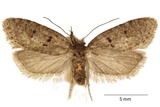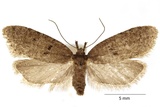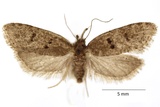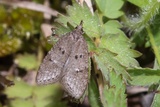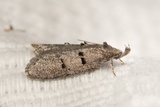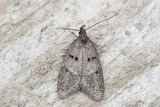Luquetia lobella (Denis & Schiffermüller, 1775) Species
Last modified: Dec. 25, 2024, 2:15 p.m.
A rather rare and local species in Belgium, but probably overlooked in many regions.
Details
- Classification
- Family: Depressariidae > Subfamily: Depressariinae > Genus: Luquetia > Species: Luquetia lobella
- Vernacular names
- Tienvlekmot (NL)
- First mention in Belgium
- De Fré Ch. 1858. Catalogue des Microlépidoptères de la Belgique. — Annales de la Société entomologique belge 2: 45–162. On page 130 (as G.[elechia] Lobella. W. V.; H.). view page
- Status
-
Native
Distribution
Caterpillar
Light green; head capsule and prothoracic plate green.
Cocoon/pupa
A tough cocoon incorporating dead leaves spun together with yellowish silk.
Bionomics
The egg is oviposited on a twig or leaf of the larval hostplant.
The first instars are not known, but the later ones hide under a loosely spun silken web on the underside of a leaf. The caterpillar feeds at night, first on the tip of the leaf and afterward, it moves to another leaf to spin again a web. The spinnings are spun mainly transversely across the leaf, so as to bend the leaf margins slightly downwards, leaving an opening in front and behind through which the larva drops quickly to the ground by the slightest disturbance. Mainly it lives close to the ground, and in any case under 1 m, are preferred, as are single-growing bushes of Prunus spinosa. The larval stage extends from early August to the end of September.
The last instar constructs a tough cocoon on the ground in which the pupa hibernates from September till June.
The adults are rarely seen during the daytime. They can be disturbed from hedgerows and come sparsely to light.
Flight periods
One generation a year from the beginning of May towards mid-July.
Habitat
Open places in forests and mixed hedgerows in which Prunus spinosa are thinly present. Blackthorn tickets are avoided.
